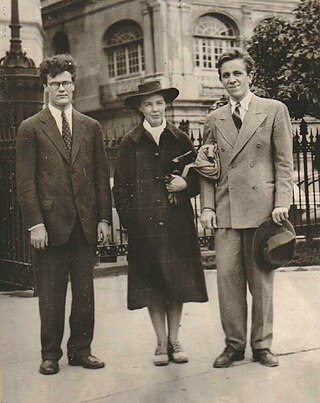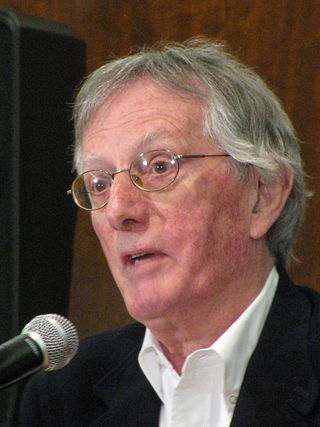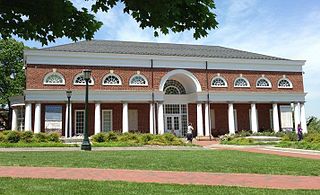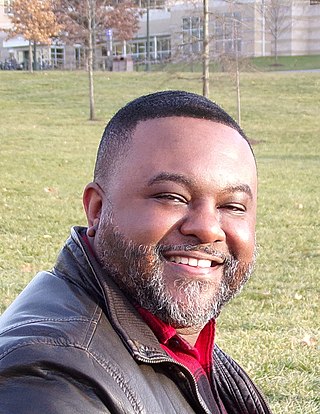Related Research Articles

William Cuthbert Faulkner was an American writer known for his novels and short stories set in the fictional Yoknapatawpha County, based on Lafayette County, Mississippi, where Faulkner spent most of his life. A Nobel laureate, Faulkner is one of the most celebrated writers of American literature and often is considered the greatest writer of Southern literature.

William Clark Styron Jr. was an American novelist and essayist who won major literary awards for his work.

Michael Cunningham is an American novelist and screenwriter. He is best known for his 1998 novel The Hours, which won the Pulitzer Prize for Fiction and the PEN/Faulkner Award in 1999. Cunningham is a professor in the practice of creative writing at Yale University.

Matthew Hillsman Taylor, Jr., known professionally as Peter Taylor, was an American novelist, short story writer, and playwright. Born and raised in Tennessee and St. Louis, Missouri, he wrote frequently about the urban South in his stories and novels.

Charles Wright is an American poet. He shared the National Book Award in 1983 for Country Music: Selected Early Poems and won the Pulitzer Prize in 1998 for Black Zodiac. From 2014 to 2015, he served as the 20th Poet Laureate of the United States.
Albert Horton Foote Jr. was an American playwright and screenwriter. He received Academy Awards for his screenplays for the 1962 film To Kill a Mockingbird, which was adapted from the 1960 novel of the same name by Harper Lee, and his original screenplay for the film Tender Mercies (1983). He was also known for his notable live television dramas produced during the Golden Age of Television.

Victor LaValle is an American author. He is the author of a short-story collection, Slapboxing with Jesus, and four novels, The Ecstatic,Big Machine,The Devil in Silver, and The Changeling. His fantasy-horror novella The Ballad of Black Tom won the 2016 Shirley Jackson Award for best novella. LaValle writes fiction primarily, though he has also written essays and book reviews for GQ, Essence Magazine, The Fader, and The Washington Post, among other publications.
Brian Evenson is an American academic and writer of both literary fiction and popular fiction, some of the latter being published under B. K. Evenson. His fiction is often described as literary minimalism, but also draws inspiration from horror, weird fiction, detective fiction, science fiction and continental philosophy. Evenson makes frequent use of dark humor and often features characters struggling with the limits and consequences of knowledge. He has also written non-fiction, and translated several books by French-language writers into English.

Mary Lee Settle was an American writer.
Frederick Busch was an American writer, and the author of nearly 30 books including volumes of short stories and novels.

David Ebershoff is an American writer, editor, and teacher. His debut novel, The Danish Girl, was adapted into an Academy Award-winning film of the same name in 2015, while his third novel, The 19th Wife, was adapted into a television movie of the same name in 2010.

Daniel Alarcón is a Peruvian-American novelist, journalist and radio producer. He is co-founder, host and executive producer of Radio Ambulante, an award-winning Spanish language podcast distributed by NPR. Currently, he is an assistant professor of broadcast journalism at the Columbia University Journalism School and writes about Latin America for The New Yorker.
Robert Bausch was an American fiction writer, the author of nine novels and one collection of short stories. He was a Professor of English at Northern Virginia Community College, and he had taught at the University of Virginia, The American University, Johns Hopkins University, George Mason University, and the University of Maryland, Baltimore County. His fourth novel, A Hole in the Earth, was a New York Times Notable Book of the Year and a Washington Post Favorite Book of the Year. He was awarded the Fellowship of Southern Writers' award for fiction for his fifth novel, The Gypsy Man. In 2005 Harcourt published his sixth novel, Out of Season, which was a Washington Post favorite book of the year. His novel Far as the Eye Can See was released by Bloomsbury Press in fall 2014, and in August 2016, Bloomsbury published his last novel, The Legend of Jesse Smoke. In 2009, he was awarded the Dos Passos Prize in Literature. He was the twin brother of the author Richard Bausch.

Harriet Frank Jr. was an American screenwriter and producer. Working with her husband Irving Ravetch, Frank received many awards during her career, including the New York Film Critics Circle Awards and the Writers Guild of America Award, and several nominations.

The Albert and Shirley Small Special Collections Library at the University of Virginia is a research library that specializes in American history and literature, history of Virginia and the southeastern United States, the history of the University of Virginia, Thomas Jefferson, and the history and arts of the book. The library is named after Albert and Shirley Small, who donated substantially to the construction of the library's current building. Albert Small, an alumnus of the University of Virginia, also donated his large personal collection of "autograph documents and rare, early printings of the Declaration of Independence." This collection includes a rare printing of the Dunlap broadside of the Declaration of Independence. Joining the library's existing Dunlap in the Tracy W. McGregor Collection of American History, Small's copy made U.Va. the only American institution with two examples of this, the earliest printing of the nation's founding document. It also includes the only letter written on July 4, 1776, by a signer of the Declaration, Caesar Rodney. The Albert H. Small Declaration of Independence Collection boasts an interactive digital display which allows visitors to view the historical documents electronically, providing access to children and an opportunity for visitors to manipulate the electronic copies without risk of damage to the original work.

Amelia Gray is an American writer. She is the author of the short story collections AM/PM, Museum of the Weird, and Gutshot, and the novels THREATS, and Isadora. Gray has been shortlisted for the PEN/Faulkner Award for Fiction and her television writing has been nominated for a WGA Award.

Imbolo Mbue is a Cameroonian-American novelist and short-story writer based in New York City. She is known for her debut novel Behold the Dreamers (2016), which has garnered her the PEN/Faulkner Award for Fiction and the Blue Metropolis Words to Change Award. Her works draw from her own experiences as an immigrant, as well as the experiences of other immigrants.
Fiction writer Joan Williams (1928-2004) was raised in Memphis, Tennessee. After schooling at the Miss Hutchinson School for Girls, she attended Bard College. During her time at Bard, Williams met and began a professional and personal relationship with novelist William Faulkner, a relationship that has overshadowed her own successful career as a novelist.

Lamar Giles is an American author of young adult novels and short stories. He best known for his award-winning novels with his most popular being Fake ID, SPIN, Not So Pure and Simple, and The Legendary Alston Boys middle grade fantasy series. He is also one of the founding members of the American non-profit We Need Diverse Books.

Rodrigo Blanco Calderón is a Venezuelan writer from Caracas. He completed his doctorate in literature and linguistics from Paris XIII University with a dissertation on the work his literary mentor, Venezuela writer Juan Carlos Méndez Guédez. He has published several collections of stories, among them Una larga fila de hombres, Los Invencibles, Las rayas and Los terneros. He has also published a novel titled The Night. A translation of his short story 'Payaso' (Clown) appears in the anthology Crude Words: Contemporary Writing from Venezuela.
References
- 1 2 William Faulkner Foundation, "Minutes of Annual Meeting of Board of Directors," 1968. William Faulkner Foundation Corporate Records.
- ↑ University of Virginia Information Service, press release (February 2, 1964). William Faulkner Foundation Corporate Records (MSS 9817-j), Albert and Shirley Small Special Collections Library, U.Va.
- ↑ Joseph Blotner, Faulkner: A Biography: One-Volume Edition (New York: Random House 1984), p. 687